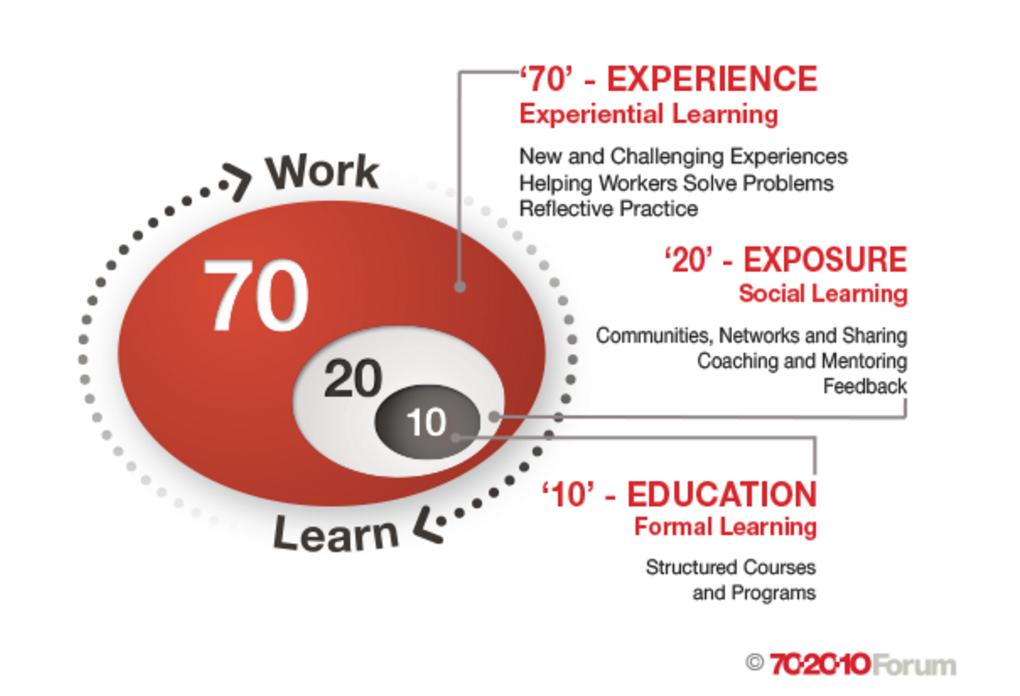Who is responsible for reskilling? Society, The Corporation, The Individual
David Vance had a provocative piece in Chief Learning Officer in April, 2017. He starts by asking "How many of you are reskilling your employees?" It is a good question. He has an answer that challenges what he sees as the conventional wisdom. He makes a clear distinction between upskilling and reskilling.
Upskilling is something that companies have been doing for a long time and it is a natural part of career development.
I have a core set of skills, over time I will (I hope) become more proficient in these skills eventually becoming an expert in some of them. I will also be adding in associated skills (if I am a pricing expert I will add market segmentation) and applying my skills in new domains (if I am a supply chain expert I may move from one industry to another, carrying my core skills with me).
Reskilling is something different. Is a lateral move in which my old skills have become less relevant and when I need to develop new skills to do new kinds of work.
In his opinion piece, David Vance argues the following ...
"If a company is acting rationally, it pays its employees because they use their skills to deliver value that is at least equal to their compensation. Now, a good learning and development function can find opportunities to upskill employees so they deliver even greater value to the organization. The best organizations do this all the time through leadership training, sales training, lean processes, and a host of other great programs. But upskilling is not the same as reskilling, and we have been upskilling for the last 60 years.Are there employees whose skills are about to become obsolete who would be good candidates for reskilling? Absolutely. Think of those in manufacturing whose manual skills are being replaced by robotics. The question for us is how many of our employees fall in this category? I don’t think the number is going to be large and certainly not large enough to make reskilling our next priority."
The problem with this position is in the final statement, that the 'number' is not going to be large. It is not clear if this refers to the 'number of skills' or the 'number of people.' This is an important difference. It is quite possible for these to vary independently. There may be a small number of people with a large number of new skills to be acquired (think of something like 'convolutional neural networks for data engineers'). Or there may be a smaller number of new skills that need to be acquired by a large number of people (perhaps 'active listening' for all managers and customer facing staff, or even something as basic today as 'web literacy').
How does David Vance, or you, or I, know just how many skills and and people will need reskilling? To know this one would have to be able to answer the following questions. I very much doubt that most companies can actually answer these with any confidence.
What skills do we need to deliver our current goals and do we have access to these skills
What skills do we need to deliver our future goals and do we have access to these skills
What are the potential skills within our organization?
If you think you can answer these questions, think of how you would present the answers to a skeptical board of directors, what questions they would ask, what evidence you would provide in support of your answers.
Reskilling and the future of work
The World Economic Forum has tried to answer these questions at a macro level in its report The Future of Jobs. The whole report is worth reading, but here is one telling table.
I find this a very conservative forecast. I don't think it takes into account the rapid transformation we are seeing across many fields driven by the intersection of AI (widely understood), social networks (including informal working alliances), and new forms of manufacturing. But even if I am wrong here, the need to replace 30-40% of workforce skills over the next five years suggests an extreme need for reskilling.
The problem then becomes who can learn which skills
Not everyone can learn anything and this is the pain we are all feeling. For each individual we need to understand their potential skills. We need to be able to answer the question "What skills can we reasonably expect this person to learn?" Answering this question is core to our ongoing research. The answer will depend on the interaction of each individual's foundational skills and their business, domain and technical skills. Foundational skills are the skills we use to acquire and apply other skills. They include the basics such as math, sciences, literacy, numeracy, visual intelligence and more general learning skills and critical thinking skills. Potential skills, or at least their activation, also depends a great deal on who we work with.
The individual is not the only meaningful unit of analysis here
People perform in teams and by combining people in new ways we can uncover new potentials. One of the most powerful ways of reskilling a group may be as simple as reshuffling teams to put together new combinations of people with complementary skills. See "Covering skill gaps - swapping, shuffling, skilling."
So who is responsible for reskilling, the individual, the company or society?
The answer has to be 'all of the above.' Skills belong to the individual, not the company, and so the individual should have ultimate accountability and control (individuals should have ownership of their own skill records for example). Companies, if they want to succeed, have an obligation to help people learn new skills by giving them the opportunities to grow at work. This does not have to mean massive training efforts. As the 702010 meme insists, we learn 70% from work, 20% from social encounters and 10% through formal training. Recombining people into new teams can do as much to promote learning as any formal training program.
Society as a whole needs to recognize and support our need to build our foundational skills throughout our lives. I have young granddaughters and am impressed by how fast they learn. But my mother, in her 80s, is also constantly learning new things and putting them to work to benefit her community. We need to do a better job of supporting people's foundational skills across their careers. It is an oversimplification, but I believe that the individual and society are primarily responsible for developing foundational skills and that the individual and companies should take the lead on business, domain and technical skills.










